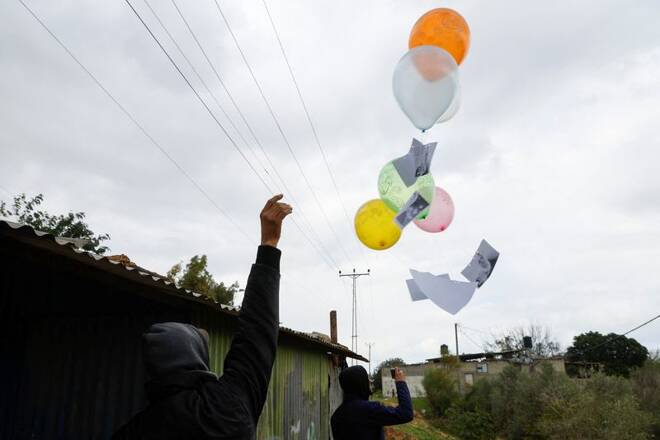Advertisement
Advertisement
Israel jail crackdown sets up showdown with Palestinian prisoners
By:
By Ali Sawafta and Nidal al-Mughrabi RAMALLAH, West Bank/GAZA (Reuters) - Soon after sirens sounded in Israel as rockets were fired from Gaza on Wednesday, hardline Security Minister Itamar Ben-Gvir said he would press on with a crackdown on Palestinian prisoners that could further inflame tensions despite U.S. calls for calm.
By Ali Sawafta and Nidal al-Mughrabi
RAMALLAH, West Bank/GAZA (Reuters) – Soon after sirens sounded in Israel as rockets were fired from Gaza on Wednesday, hardline Security Minister Itamar Ben-Gvir said he would press on with a crackdown on Palestinian prisoners that could further inflame tensions despite U.S. calls for calm.
Ben-Gvir this week ordered a halt to Palestinian security prisoners working in bread bakeries in two Israeli jails, saying he was cancelling “benefits and indulgences”. He added: “The death penalty should be enacted for terrorists but until then, they should be treated as terrorists.”
On Thursday, a state of heightened alert with reinforced staffing levels was imposed, a spokesperson for the prison service said. She said authorities had received intelligence that prisoners were planning to harm prison staff.
The looming showdown between the prisoners and Ben-Gvir comes days after U.S. Secretary of State Antony Blinken called on both sides to do everything to lower tensions following weeks of violence in Jerusalem and the Israeli-occupied West Bank, as well as exchanges of cross-border fire with Gaza.
As a relatively unified group that largely transcends the factional divisions among Palestinian political and militant movements, the prisoners wield significant influence and Ben-Gvir’s decision to take them on risks wider confrontation.
“He thinks that the prisoners issue is the easiest issue to show he is a serious leader,” said Kadora Fares, head of the Palestinian Prisoners Society.
“He thinks that because 4,000 prisoners are in their jails he can do what he wants, but he will be choked because they affect the situation outside the jails.”
Unless the standoff is resolved, he said, Palestinian prisoners will hold a mass hunger strike from March 22, at the start of the Muslim holy month of Ramadan, traditionally a time of heightened tensions.
Added to stricter measures imposed in a number of jails and reports of clashes after guards confiscated electronic devices belonging to some women prisoners this week, Ben-Gvir’s tough approach sets up a confrontation with a group that enjoys strong popular support among Palestinians.
Boiling point
Israel holds about 4,700 political prisoners, around 30 of them women, according to the Palestinian Addameer organisation that supports prisoner rights. The number includes convicted inmates as well as so-called administrative detainees, held without charge or trial.
One inmate reached by telephone, who did not want to be named for fear of reprisal by authorities in the prison where he is serving an extended sentence, said the situation in the jails had reached “boiling point”, with male prisoners closely following what had happened to their female counterparts.
Hanan Al-Khatib, a lawyer for the Palestinian Agency for Prisoners and Ex-prisoners, said prison guards had conducted “provocative searches” in the rooms of three women inmates on Monday leading to protests in which two rooms were set on fire.
She said the measures against female prisoners led to “rebellion in all jails and the tension is escalating”.
A spokesperson for Israel’s prison service said two women had been put in solitary confinement after prisoners cheered the news that a lone Palestinian gunman had shot seven people near a synagogue on the outskirts of Jerusalem on Jan. 27.
“There were no clashes or use of tear gas or whatever they described there, there wasn’t,” said spokesperson Hana Herbst. “In solitary you don’t have access to electronics, maybe that’s what they were talking about.”
Israeli prison authorities have allowed some leeway to political prisoners in exchange for cooperation in turning out for roll calls, cleaning their own corridors and vacating cells when guards come for checks. If inmates stopped doing these things in protest, running prisons smoothly would get harder.
But Ben-Gvir has made clear that he has little interest in such arrangements, opening the way for a confrontation, Palestinian groups warn, stoking an already tense situation close to eruption after months of raids in the West Bank.
“We are heading towards an intifada (uprising) unless mediators intervene and end the criminal policies of Ben-Gvir that are driving the region to an explosion,” Hamas official Mushir Al-Masri told a Gaza rally in support of women prisoners.
(Additional reporting by Emily Rose in Jerusalem; writing by James Mackenzie; editing by Mark Heinrich)
About the Author
Reuterscontributor
Reuters, the news and media division of Thomson Reuters, is the world’s largest international multimedia news provider reaching more than one billion people every day. Reuters provides trusted business, financial, national, and international news to professionals via Thomson Reuters desktops, the world's media organizations, and directly to consumers at Reuters.com and via Reuters TV. Learn more about Thomson Reuters products:
Did you find this article useful?
Latest news and analysis
Advertisement
